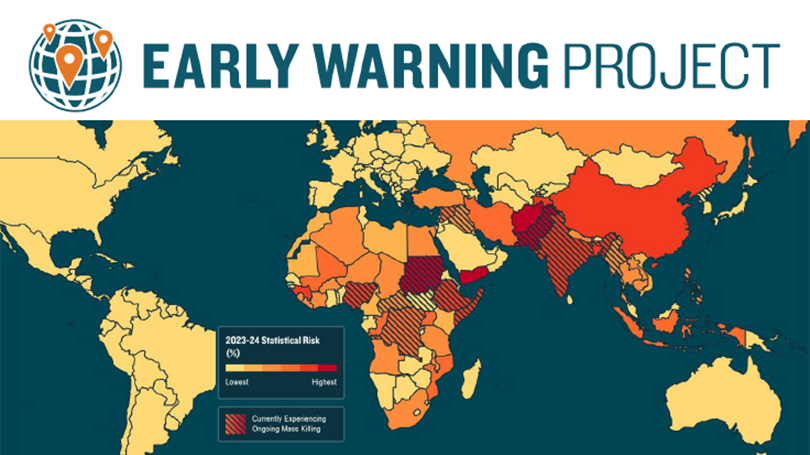
- About
- Programs
- Student Opportunities
- For Faculty
- News & Events
Back to Top Nav
Back to Top Nav
Back to Top Nav
Back to Top Nav
Back to Top Nav
The Early Warning Project, our collaboration with the Simon-Skjodt Center for the Prevention of Genocide at the United States Holocaust Memorial Museum, is out with the 2023-24 assessment of the risk of mass atrocities in countries around the world. https://earlywarningproject.ushmm.org
The assessment identifies the risk—the possibility—that a mass killing may take place. On average, one or two countries experience a new episode of mass killing each year. But relative infrequency does not make the brutality less devastating for victims: a mass killing, defined as 1,000 or more civilians deliberately killed by armed forces (whether government or nonstate), over a period of a year or less, because of their membership in a particular group. Virtually all cases of genocide include mass killings that meet this definition.
In many places, mass killings are ongoing—in countries such as Burma, Ethiopia, South Sudan, and Syria. These cases are well known. But this risk assessment's primary focus—and the gap we seek to fill—is to draw attention to countries at risk of a new outbreak of mass killing. We use this model as one input for selecting countries for more in-depth research and policy engagement. The Simon-Skjodt Center focuses on situations where there is a risk of large-scale, group-targeted, identity-based mass atrocities, or where these are ongoing, and where we believe we can make the most impact based on a combination of factors. These factors include the ability for Simon-Skjodt Center staff or partners to conduct rigorous field work in the area (or a preexisting level of staff expertise in the area), opportunities for effective engagement with the community at risk, and the need to draw attention to cases where policy, media, and public attention on the case are lower than merited by the level of risk.
The Early Warning Project's definition of mass killing excludes situations in which an armed group (state or nonstate) residing in one country attacks civilians in another country's territory. The only exceptions to this rule are situations where we can document substantial and close coordination in killing operations between the foreign armed group and the government of the state where the targeted civilian group resides. This means the Project's definition of mass killing does not include Russian forces' deliberate targeting of civilians in Ukraine, civilian killings in Yemen perpetrated by the Saudi-led coalition, or civilian killings in the war between Israel and Hamas. The decision to exclude these mass killings does not involve a value judgment about the moral or practical significance of atrocities perpetrated during wars between states, international terrorism, and other international military operations, only a pragmatic judgment about what we are able to forecast more reliably
The Early Warning Project—a joint initiative of the Simon-Skjodt Center for the Prevention of Genocide at the United States Holocaust Memorial Museum and the Dickey Center for International Understanding at Dartmouth College—has produced a global risk assessment every year since 2014. The EWP works to be a trusted partner for policy makers by using innovative research to identify early warning signs.